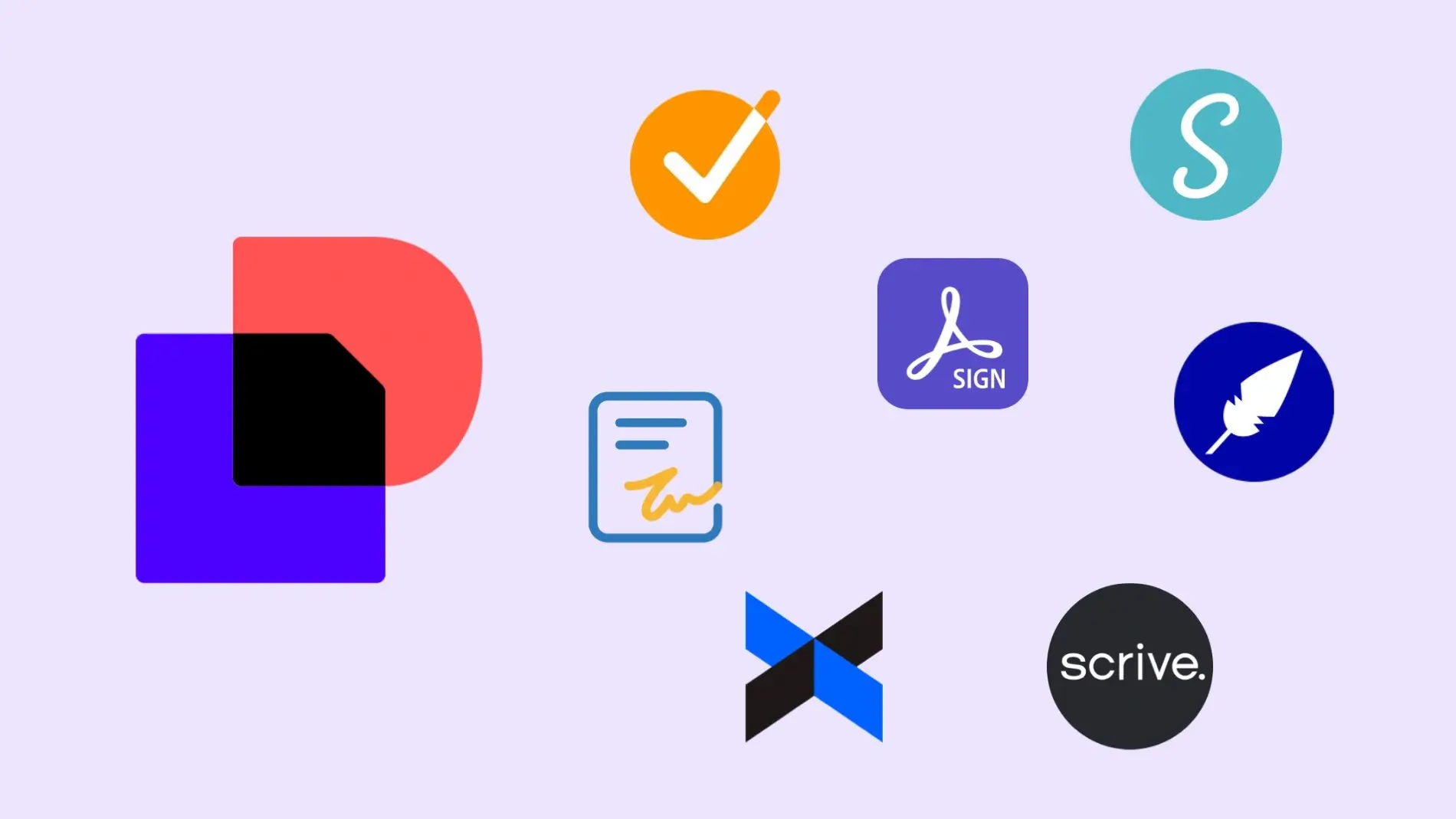DocuSign might be the industry giant in e-signatures, but that doesn’t mean it’s the best fit for every team in 2025.
Whether you’ve hit limitations on pricing, customization, CRM integration, or post-signature workflows - many modern businesses are reevaluating their tools and looking for platforms that do more than just capture a signature.
From sales teams needing deeper buyer insights, to legal and ops teams demanding better workflow control, today’s alternatives to DocuSign offer stronger integrations, more flexibility, and built-in collaboration.
In this guide, we break down 7 top DocuSign alternatives - tested across real use cases, and ranked by what they actually help you do better:
- Automate document creation
- Streamline approvals and renewals
- Ensure compliance in every region
- Track engagement after send
- Accelerate every stage of your agreement workflows
Whether you’re a fast-growing SaaS team or a compliance-heavy enterprise, there’s a better fit out there. Let’s find it.
Why companies switch from DocuSign
DocuSign is trusted, secure, and widely adopted - but that doesn’t mean it’s the most efficient or scalable option for every team.
Here’s where DocuSign often falls short (and why businesses are exploring alternatives in 2025):
1. Limited workflow flexibility
DocuSign handles signatures well, but building custom workflows around those signatures - especially for multi-step approvals, renewals, or upsells - can be rigid without expensive add-ons.
2. Minimal post-send engagement
Once a document is sent, you’re in the dark. There’s little visibility into how recipients engage with it - no analytics, no comments, no way to guide the deal forward.
3. Price vs. value
DocuSign’s enterprise pricing scales fast. For teams that only use a portion of the platform’s features - or need broader functionality (like CPQ, proposal tracking, or renewal workflows) - the ROI becomes harder to justify.
4. Lack of sales enablement tools
DocuSign isn’t built with sales in mind. There’s no support for embedded video, digital sales rooms, or interactive proposals - which makes it harder for revenue teams to build momentum and stand out.
5. Complex admin for scaling teams
For growing companies managing hundreds of users, DocuSign’s admin controls and user management can feel clunky - especially when dealing with multiple departments or business units.
The best DocuSign alternatives in 2025
DocuSign still dominates on name recognition - but if you’re looking for more automation, engagement, or control, it might be time to switch.
Below are seven powerful alternatives built to streamline signature workflows and everything that happens before and after.
1. GetAccept
Best for revenue teams that want engagement, automation, and visibility - not just signatures.
GetAccept goes beyond e-signatures. It’s a full Digital Sales Room platform designed to manage the entire deal cycle - from interactive proposals and buyer engagement to automated renewals and contract workflows.
For companies that want to close deals faster, reduce churn, and improve the buying experience, GetAccept is a powerful DocuSign alternative.

Why teams choose GetAccept over DocuSign:
- CRM-native workflows: Deep integration with Salesforce, HubSpot, and others lets you send, track, and automate documents directly within your CRM.
- Real-time buyer engagement: Track opens, views, shares, comments, and even add video or chat to your proposals.
- Flexible approvals & workflows: Route documents based on logic, roles, or deal stage - without custom dev or third-party tools.
- Subscription & renewal support: Built-in tools to manage co-terming, upsells, and renewal reminders.
- Digital Sales Rooms: Create a central workspace for all stakeholders - no more attachments or version chaos.
Potential drawbacks:
- May be feature-rich for teams that just need basic signatures.
- Requires onboarding to get full value from sales enablement features.
Best for:
Sales-led organizations (especially SaaS, tech, or B2B services) that want to drive engagement, speed up deals, and gain full visibility from first touch to renewal.
Thinking about changing from DocuSign?
See how GetAccept replaces DocuSign and adds engagement, automation, and real-time insights - all in one platform.
2. Adobe Acrobat Sign
Best for enterprise teams standardized on the Microsoft ecosystem
Adobe Acrobat Sign is a trusted, enterprise-ready DocuSign alternative with robust security and compliance credentials. It's tightly integrated with Microsoft 365 and offers scalable document workflows across global teams - especially useful for organizations already embedded in the Microsoft stack.
Why teams choose Adobe Sign over DocuSign:
- Deep Microsoft integrations: Native functionality with Word, Outlook, Teams, SharePoint, and Dynamics.
- Enterprise-grade compliance: Meets requirements like eIDAS (QES optional), HIPAA, FedRAMP, and ISO 27001.
- Custom workflows: Automate multi-stage approvals and document routing across departments.
- Audit trails & identity verification: Built-in tools for secure, compliant signing at scale.
- Adobe ecosystem compatibility: Works seamlessly with Acrobat and other Adobe tools for PDF creation, editing, and storage.
Potential drawbacks:
- UI can feel dated compared to newer platforms.
- Less focused on sales or customer-facing workflows.
- Complex features may require IT support for setup and management.
Best for:
Enterprises that need secure, compliant document workflows and already rely on Microsoft or Adobe infrastructure.
3. Dropbox Sign
Best for growing teams who want simplicity and affordability
Dropbox Sign is a lightweight yet reliable e-signature solution that appeals to startups and growing businesses. It’s known for its clean user interface, simple workflow setup, and native integration with Dropbox - making it a strong DocuSign alternative for teams that don’t need deep enterprise features.

Why teams choose Dropbox Sign over DocuSign:
- Clean, user-friendly interface: Easy to onboard teams without heavy training or IT support.
- Dropbox integration: Works seamlessly for teams already using Dropbox to store and share documents.
- Transparent, affordable pricing: Flat-rate pricing with no hidden costs.
- API access: Developer-friendly for embedding signatures into custom apps or platforms.
Potential drawbacks:
- Lacks advanced compliance features like QES for heavily regulated industries.
- Limited automation and workflow customization compared to enterprise tools.
- Not built for complex multi-stakeholder deals or contract lifecycle management.
Best for:
SMBs and scaling teams that prioritize ease of use and affordability over advanced features.
4. Scrive
Best for compliance-driven teams operating in Europe
Scrive is an e-signature solution built with legal strength and regulatory compliance at its core. With robust support for eIDAS-compliant Qualified Electronic Signatures (QES), it’s an ideal DocuSign alternative for teams operating in highly regulated industries or across EU borders.

Why teams choose Scrive over DocuSign:
- Strong QES support: Fully supports eIDAS requirements for Qualified Electronic Signatures - critical for legal, healthcare, and financial sectors in Europe.
- Identity verification: BankID, SMS verification, and biometric options available for signer authentication.
- Data residency & security: ISO 27001 certified, with European data centers and detailed audit trails.
- CRM integrations: Works with Salesforce, Microsoft Dynamics, and others to streamline workflows.
Potential drawbacks:
- Interface is more functional than modern - may feel dated compared to newer platforms.
- Lacks advanced buyer engagement features like video, live chat, or interactive proposal elements.
- More focused on compliance than sales enablement.
Best for:
Organizations in Europe (or selling into Europe) that need secure, legally binding signatures with ironclad compliance.
Need more than just compliance?
GetAccept gives your team real-time buyer insights, built-in renewal workflows, and document engagement tracking - all in one place.
5. SignWell
Best for small teams needing simple, compliant signing at a low cost
SignWell is a lightweight, user-friendly alternative to DocuSign that covers the essentials: legally binding signatures, templates, reminders, and audit trails - all at a fraction of the cost. It’s great for startups, agencies, or internal teams who need simplicity and speed without sacrificing compliance.
Why teams choose SignWell over DocuSign:
- Affordable pricing: One of the most cost-effective platforms for e-signatures, especially at lower user counts.
- Clean, simple UI: Easy for both senders and recipients to use - minimal learning curve.
- Legally compliant: Supports UETA, ESIGN, and GDPR compliance, with downloadable audit trails and tamper-proof documents.
- Templates & reminders: Built-in tools for recurring documents and automatic follow-ups.
Potential drawbacks:
- Limited enterprise features - no CPQ, CRM-native workflows, or complex role-based routing.
- No native support for QES or advanced authentication methods.
- Lacks integrations and automation compared to more robust platforms.
Best for:
Lean teams or startups that want fast, reliable, compliant signatures - without enterprise bells and whistles.
6. Xodo sign
Best for teams that need flexible API and budget-friendly plans
Xodo sign (formerly Eversign) is a solid DocuSign alternative for small to mid-sized businesses looking for e-signatures, templates, and flexible API access without high upfront costs. It’s popular among developers and growing businesses who need customization without enterprise-level pricing.

Why teams choose Xodosign over DocuSign:
- Robust API at low cost: Ideal for SaaS products or internal tools needing integrated e-sign.
- Affordable plans: Transparent pricing with generous quotas compared to DocuSign.
- Document automation: Supports templates, audit trails, in-person signing, and reminders.
- Secure & compliant: Meets ESIGN and UETA requirements, with encryption and detailed audit logs.
Potential drawbacks:
- The UI is a bit dated compared to modern tools.
- Limited integrations - fewer out-of-the-box CRM or billing platform connections.
- Lacks native support for QES or advanced buyer engagement tools.
Best for:
SMBs, startups, or dev teams building e-signature flows into their own platforms without blowing the budget.
7. Zoho Sign
Best for teams already using Zoho’s ecosystem
Zoho Sign is part of the larger Zoho suite and makes a strong DocuSign alternative for businesses that already use Zoho CRM, Zoho Books, or Zoho Projects. It offers legally compliant e-signatures, automation tools, and tight integration with other Zoho apps - all at a highly competitive price.
Why teams choose Zoho Sign over DocuSign:
- Seamless integration with Zoho apps (CRM, Mail, Books, etc.)
- eIDAS, ESIGN, and UETA compliant - suitable for global use
- Affordable and scalable pricing for growing businesses
- Workflow automation and API support for custom scenarios
Potential drawbacks:
- Not ideal for teams outside the Zoho ecosystem
- Lacks deep buyer engagement or sales-specific features
- Fewer third-party integrations than DocuSign or GetAccept
Best for:
Startups or mid-market teams already using Zoho products that want a native e-signature solution without overpaying for unused enterprise features.
DocuSign Alternatives at a glance
Here's a side-by-side comparison of the seven top DocuSign alternatives we reviewed - with a focus on what matters most for growing teams: CRM integration, compliance, engagement, and ease of scaling.
| Platform | CRM integration | Compliance | Engagement tools | Best For |
| GetAccept | Salesforce, HubSpot, Dynamics... | SOC 2, eIDAS, QES | Live chat, video, analytics | Sales teams needing full-cycle deal acceleration |
| Adobe Acrobat Sign | Microsoft 365, Salesforce... | HIPAA, FedRAMP, eIDAS | Basic tracking | Enterprises on the Microsoft stack |
| Dropbox Sign | HubSpot, Salesforce, Zapier... | SOC 2, eIDAS | Basic open/view tracking | MBs seeking lightweight DocuSign alternatives |
| Scrive | Salesforce, Dynamics... | QES, BankID, ISO 27001 | Compliance-first, no chat/video | Regulated industries across Europe |
| SignWell | Zapier, API... | UETA, ESIGN | Status updates, audit trails | Freelancers and lean teams needing simple, affordable signing |
| Eversign | Google Drive, Dropbox, API... | GDPR, eIDAS, ESIGN | Templates, basic tracking | Small to mid-sized teams wanting ease of use |
| Zoho Sign | Zoho CRM, API... | ESIGN, UETA, eIDAS | Status notifications | Businesses using Zoho tools looking for built-in e-signature |
As you can see, while all seven platforms offer legally binding electronic signatures, they vary widely in how they support CRM workflows, buyer engagement, and regulatory compliance.
Whether you're scaling sales, streamlining operations, or operating in a compliance-heavy space, the right DocuSign alternative depends on your team's priorities.
From signature to scale: find the right fit for 2025
DocuSign may be the market leader, but that doesn’t mean it’s the best fit for every team. As sales processes evolve, security expectations rise, and engagement becomes mission-critical, more businesses are looking for tools that do more than just collect a signature.
Whether you’re a fast-moving SaaS team, a compliance-heavy enterprise, or a startup looking for simplicity, there’s now a range of purpose-built alternatives that offer stronger CRM integration, smarter engagement insights, and pricing that scales with your needs.
And if you’re ready to streamline more than just signing - from proposal to renewal - one platform stands out.
Power your revenue motion with GetAccept
GetAccept combines proposals, contracts, e-signatures, and buyer engagement - all in one connected platform.
- 75% faster proposal turnaround
- Full CRM integration
- Built-in renewal workflows
- Real-time visibility into buyer activity
Ready to leave basic signing behind?
See how GetAccept helps you engage buyers, automate processes, and close deals faster.



